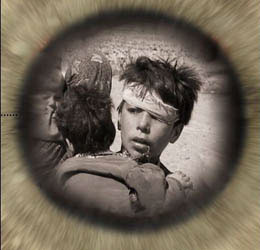
Suffering without borders
Given a timely release as U.S. troops join the war in Afghanistan, "Jung (War)
in the Land of the Mujaheddin" follows the efforts of an Italian medical team to
treat civilian casualties and opens Western eyes to the reality behind the term
"humanitarian aid."
By DAVID
LIPFERT
www.offoffoff.com
(Previously featured in the Human Rights Watch International
Film Festival.)
A voice laments that everyone has forgotten the war in Afghanistan in the new documentary
"Jung." Everything changed on Sept. 11, and since then nobody has escaped the
barrage of news and information about that country in the middle of Asia. Two decades on
and the various ethnic and tribal groupings are still slugging it out. The Russians have
come and gone, interim governments have fallen as quickly as they are announced. Boosted
by Saudi Arabia and Pakistan, the Taliban regime has lasted five years. All of that time,
skirmishes and full-out battles with the Northern Alliance have brought war within reach
of everyone in Afghanistan.
|
JUNG (WAR) IN THE
LAND OF THE MUJAHEDDIN |
Directed
by: Fabrizio Lazzaretti, Alberto Vendemmiati, Line producer&editor Giuseppe Petitto.
Music by Mario Crispi.
Official site |
Into this pitiful situation comes an Italian pacificist NGO called Emergency led by Dr.
Gino Strada. They have attempted to insert a ray of hope into the bleak mountainous
landscape in the form of hospitals. The first one set up in the northern village of Anabah
is the subject of "Jung." The film opens with shots of Dr. Strada along with
professional if culturally insensitive nurse Kate Rowlands and a veteran Italian
journalist Ettore Mo making their way via air and land to Afghanistan in 1999. Their
first-choice location inside the area under the Northern Alliance falls into Taliban
hands, leaving Anabah as next best site for the new hospital. Negotiations for this prime
real estate (it was to have been a police academy in more optimistic days) are predictably
arduous. Good sense prevails in the end, and a convoy of supplies from Italy arrives to
enable a skeletal setup to operate by mid-December 1999.
Thanks to the ongoing war, there is a steady stream of patients, for the most part
civilian or war wounded or victims of land mines. Some of the shots of surgical
amputations are not for the fainthearted, but they convey the reality that American TV
coverage has largely avoided. To their credit, neither Strada nor the others let their
feelings go numb, and their concern for their patients' pain and suffering is nothing less
than moving. One of the few lighter moments in "Jung" shows a staff party in
full swing, only to be interrupted to order to operate on a new casualty. Strada's
eloquence regarding the senselessness of war should be required viewing for everyone in
Afghanistan and elsewhere.
 |
|
Limited social counseling is shown, too, but the Westerners have a hard
nut to crack. Daut, a young Northern Alliance fighter, cannot be dissuaded from returning
to the front lines minus one foot. A terminal cancer victim gradually relents to allow his
wife to clean at the hospital to support the family.
As of mid-November 2001 it seems that fighting will subside, but the scourge of land mines
will kill and maim innocent Afghanis for years to come. There have been other films
specifically on the devastation caused by personnel mines, but "Jung" makes the
case no less effectively. The film's U.S. distributor Human Rights Watch could have
included a statement at the end about the American refusal to sign the international
convention on land mines.
Fabrizio Lazzaretti and Alberto Vendemmiati tell the story well without milking it for
sentimentality. Some of the scenes seem staged, but this is the unspoken norm for
documentaries. A lot of the images we are seeing from Afghanistan focus on the bleak
landscape there, but "Jung" by contrast is highly colorful, especially in
outdoors. Clutches of women in light blue burkas enliven market scenes, even drably clad
mujaheddin appear to best advantage silhouetted against the mountains. Mario Crispi's
soundtrack is so apt that it blends almost imperceptibly into the narration. Pity that a
film of such high quality was not dubbed into English to ensure a wider audience.
Subsequent to completing this film, Emergency established another hospital at Kabul in
(former) Taliban territory. Dr. Strada has lately been holding forth from there following
a brief closure, even during the recent intense fighting. Round-the-clock operations on
the wounded there have been the norm per his reports disseminated at Emergency's web site. Luckily there
are more hospitals in Afghanistan than these. Another Italian doctor, Alberto Cairo, has
been at a Red Cross facility in Kabul for the past 12 years to offer reconstructive
orthopedics and prostheses for the ravaged populace. Mohsen Makhmalbaf's
"Khandahar," set for imminent U.S. release, shows yet another such medical
center, probably in the southwestern sector.
The value of "Jung" will be to put a face on the phrase "humanitarian
aid" that is now used so glibly in the media. Selfless, dedicated professionals like
Dr. Strada and the others depicted in the film offer a ray of hope to a land where human
values have all but been smothered. Maybe it will inspire similar efforts in other
deserving corners of the world that have been forgotten.
NOVEMBER 23, 2001
OFFOFFOFF.COM • A GUIDE TO ALTERNATIVE NEW YORK
Comment
on "Jung (War) in the Land of the Mujaheddin"
|





